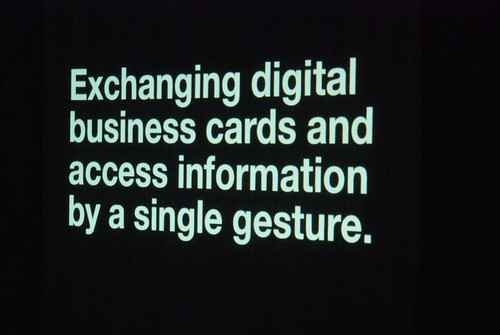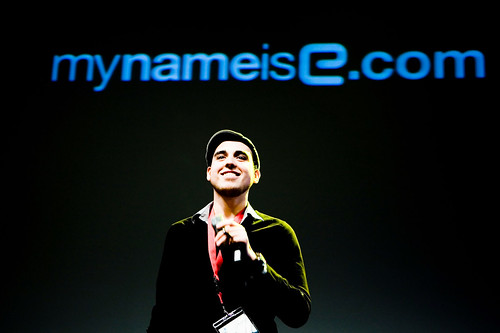
 This is a guest post by Renato Valdes Olmos. He’s the founder of My Name is E and they won The Next Web Startup Rally last year.
This is a guest post by Renato Valdes Olmos. He’s the founder of My Name is E and they won The Next Web Startup Rally last year.
It’s April again, a very special month for our company. Last year around this time we were right in the middle of finalizing our software builds for a soft launch at The Next Web conference in our hometown of Amsterdam. At the same time, trying to get through the first rounds of the startups that applied for their startup rally.
Handling a major deadline, managing a team and perfecting your stage talk is extremely time consuming and nerve wrecking in such a short amount of time. But when we got shortlisted as finalists we actually added a little fuel to the fire and prepared a bit more. Finalize the software. Finish the mobile web client. Produce a cool introduction video. Prepare a great pitch.
We used online channels to get as much people pumped up and rooting for us, and got on the stage to do the best we could.
Pitching for large audiences rather than investors is quite a different story. Many people will tell you to practice pitches as much as you can, and you’ll do well. I don’t entirely agree with that assumption. For some people, practicing pitches in front of a mirror works each time, but I believe that if you have a clear vision for your company, there’s no need to practice that story.
However, when it comes to adapting that story to your audience, a correct amount of modifications is definitely needed. I’ll follow with some tips on how to create a great pitch for large audiences at events for internet professionals:
 Join 1000 Internet professionals and a lot of exiting new start-ups for the 5th edition of The Next Web Conference. A must attend! Grab your discounted ticket now!
Join 1000 Internet professionals and a lot of exiting new start-ups for the 5th edition of The Next Web Conference. A must attend! Grab your discounted ticket now!
1. Your audience is broad.
Don’t assume there are just investors in the audience. Don’t assume it’s just press. The audience of events in this field is very wide spread, so try to summarize what you in clear language that’s understandable to everybody. Don’t dumb things down, but be sure to avoid buzzwords and jargon as much as possible. Audiences come to events to learn and get inspired. Startup companies can have the very same effect on audiences, so try to influence.

2. Stories are good.
People generally dislike marketing pitches. I hate them to be honest. Pitching your company is marketing however, but the acceptance of the audience lies in how well you’re able to tell your story. Audiences love stories. Good pitches and presentations are often architected as stories – a clear introduction; get people interested. A solidcenter piece; dive into your company or product and give them a taste that leaves them wanting more. And a grand finale; leave them with something unforgettable. A big bang.

3. Keep it simple.
Information overload is your nemesis. Bullet points are his minions. The last thing you want to do is that people start reading your slides instead of paying attention to what you have to say. It’s better to have 50 slides with a single sentence or word, than 15 slides filled up with enough prose to finish a novel. Deliberately direct your audience’s attention to the screen when you want to demo your product or show a video. Using full screen images often works better than slide keywords. Using blank slides helps focusing your audience on your stories, or gives them a visual pause to indicate a new section. Slides should support your story, not the other way around.

4. Show off the goods.
Spend some time on creating clear screencasts of your product, or invest in the production of an informative video. Doing this work beforehand saves you from beta blunders on stage (only do live demos when you’re a 100% certain it will work, but even then… hardware has a tendency to fail miserably) so you can continue your flow without interruptions. And believe me, pitching your company for 5 minutes on stage feels like mere seconds.

5. Prepare for hell.
The most difficult part of the competition is often the question round that follows your pitch. The success of a pitch is entirely up to you, but questions from the judges and the audience can be surprisingly hard. They can be about competition, previous mistakes, strategies, things that co-founders or employees have more knowledge about – you can’t predict what’s coming. But that doesn’t mean you can’t prepare. Make sure you have answers ready for the usual suspects: What’s your business model? Are you generating revenue, and if not: when? How much capital are you raising, and why? And prepare for the most annoying questions you can think of, because people will ask them. Come up with answers for those questions that you don’t want to hear. And if there’s a question you really don’t have an answer for, be transparent and tell the truth. Making up some bullshit story won’t help your credibility unless it’s either really awesome or funny.

6. Smile.
Pause for a moment if you black out. Don’t panic. Take a look at your last slide and describe what you see. You’ll get back into your flow in no time. When you get confronted with negative feedback or questions about competition, don’t fall into defensive mode. This is a mistake I’ve made in the past, but I’ve learned that approaching each question positively turns out a lot more fruitful than shrugging off.
I believe these general guidelines can be applied to any product pitch. Don’t follow them blindly, use them to your advantage and try to find the angle which is most comfortable for your company and you as a presenter. It helped us to win the startup competition with a great amount of benefits afterwards.
I’m really interested in how you prepare for presentations or if you disagree with my tips. If you have something to add, leave a comment!
I’ll be hanging out at The Next Web this year, representing E as a visitor this time, rooting for the new round of startups. If you feel like saying hello, consider visiting. It’s well worth the trip.
Get the TNW newsletter
Get the most important tech news in your inbox each week.




